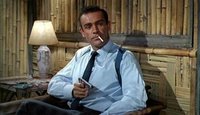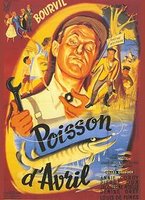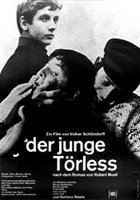Thursday, July 27, 2006
Ugetsu Monogatari
1953, Japan, directed by Mizoguchi Kenji
One of those rare films that fully lives up to its advance billing, Ugetsu Monogatari is a unique blend of realism and fantasy, told with great cinematic virtuosity. Set in the 16th century against a backdrop of civil war, the film opens, nonetheless, in a bucolic village, and the first 40 minutes are an exquisite depiction of peasant and family life, focused on tiny details of craftsmanship and family relations; the cooperation between farmer/potter Genjuro and his wife Miyagi is both convincing and deeply moving. Even as her husband senses the opportunities for enrichment created by the still-distant war, Miyagi makes clear her own contentment at her small family's place in the world; Mizoguchi delicately conveys the sense that there's much to lose even in this apparently simple way of life.
The carefully rooted realism of the village sequences ensures that the ensuing developments - as the film departs in directions both mysterious and and tragic - are all the more effectively disturbing. Genjuro's encounter with the mysterious Lady Wakasa (played, to startling effect, by Machiko Kyo) is a wrenching viewing experience; that the depths of Genjuro's betrayal can only be revealed by a fatal obsession says much about Mizoguchi's unsentimental world-view. Visually, the film is a feast, with gorgeously composed shots and a camera that seems constantly on the move, rising high over the action, then prowling at ground level, perhaps never more effectively than in the beautiful shot that accompanies Genjuro's return home, and which perfectly encapsulates the film's otherworldly feel. The Criterion Collection treatment underlines, again, what a shame it is that more of Mizoguchi's films aren't available on DVD [this situation has, happily, improved a good deal since 2006, not least through the efforts of the Criterion Collection].
Tuesday, July 25, 2006
Dr. No

1962, UK, directed by Terence Young
The first Bond movie, despite its exotic trappings, is one of the most restrained in scale: almost all of the action takes place in relatively tiny Jamaica (or on Pinewood sets), rather than the near constant jet-setting that often proved confusing in later movies. While the overall template is already firmly in place - Bond takes on a sinister megalomaniac intent on world domination - many of the flourishes that would later prove so critical to the franchise (Desmond Llewellyn's turns as Q, for instance) have not yet been grafted on.
While the supporting structure is thus not quite as comfortingly familiar, Sean Connery, as Bond, appears to have been born fully formed into the part: from the first moment he appears onscreen, he exudes a charm and assurance that transcends the often rickety plot and the archly incredible villain. Though Ian Fleming's first Bond book had appeared almost a decade previously, Bond seems a perfect 60's hero: he embodies the attractions of the golden age of jet travel, apparently possessed of infinite resources and resourcefulness, and engages in casual sex and even more casual violence in a manner that seems to typify that decade, throwing off the comfortable but dreadfully unexciting 50's with glee. The first 'Bond, James Bond' and the familiar Bond theme remain as stirring as ever, while Ursula Andress's emergence from the sea is one of the franchise's most iconic and enjoyable moments.
Monday, July 17, 2006
Poisson d'avril

1954, France, directed by Gilles Grangier
It’s odd that the disc this film appears on is marketed as part of a collection of films featuring the hugely popular French comic Louis de Funès, since he appears in just two scenes, and his performance, the broadest of caricatures, is hardly his best work. The star of the film is the subtler Bourvil, cast, as so often, in a salt-of-the-earth part; the actors would be reunited a decade later in Le Corniaud and La Grande vadrouille, two of the French box-office’s biggest all-time hits. Although Poisson d'avril is exactly the kind of simple, production-line fare that prompted so much dismissive comment by the nouvelle vague critics and filmmakers (often one and the same) just a few years later, Bourvil’s easygoing charm and the often witty script (with dialogue by the great Michel Audiard, whose phrasing and rhythms cast a long shadow over French popular filmmaking of the 1950’s and 1960’s) ensure that the film remains very watchable. Gilles Grangier, who directed many of Jean Gabin’s later films, gives his actors room to savour the script’s best lines, while there’s a surprising vein of commentary on attitudes to the wartime experience.
Saturday, July 15, 2006
De battre mon coeur s'est arrêté
2005, France, directed by Jacques Audiard (The Beat That My Heart Skipped)
Director Jacques Audiard has carved out one of the most interesting resumes in recent French film, with his own very particular take on noir themes of violence and redemption, and fine skills as both a wordsmith (hardly surprising given that his father was the great dialoguist Michel Audiard) and a director of actors, especially of younger actors like Mathieu Kassowitz, Emmanuelle Devos and, here, Romain Duris. Though Duris has taken on edgy material before, he’s never been more convincing than in this film; the conflict between his professional violence and the calm he seeks in music is brilliantly conveyed in a performance of control mixed with explosive aggression. The plot is taken from James Toback’s 1978 film Fingers, but the adaptation is so seamless that it feels as though it was conceived in the underbelly of Paris, while the addition of a subplot involving a piano tutor who speaks no French is highly effective. Duris's Thomas should be exceptionally unsympathetic, given his unpleasant work in the employ of his slumlord father, but his desire for a better life, and his dedication to what seems like a foolish dream, not to mention the actor’s energy, render the character complex, confusing and appealing. There’s able support, too, from a rumpled Niels Arestrup, the underused Emmanuelle Devos, and Linh Dan Pham (who reveals her own capacity for anger to startling effect) as the piano tutor.
Friday, July 14, 2006
Lola rennt

1998, Germany, directed by Tom Tykwer (Run Lola Run)
Though it's nowhere near as profound as its philosopophical trappings would like you to believe, this remains one of the most sheerly enjoyable European movies of the 1990's. Director Tom Tykwer's fascination with coincidences, intertwined fates and split-second decisions (all present in earlier work like Winter Sleepers) is given full reign here, where the same tale (of a frantic 20-minute search for 100,000 Deutschmarks) is told three times, with the devil in the minor variations, and three profoundly different outcomes. Each version is separated by a brief interlude that fills in some of the back story between Lola (Franka Potente, who burns up the screen) and Manni (Moritz Bleibtreu), the boyfriend she's attempting to get out of trouble. While the pauses take themselves too seriously, they do help to make Manni, in particular, a more appealing character than his ne'er-do-well behaviour might otherwise allow (Moritz Bleibtreu's reserves of charm also help). Tykwer employs a full bag of cinematic tricks, switching camera styles, throwing in amusing photo-journal montages to outline the fates of minor characters, and adding a dash of split-screen action, all set to a frenetic techno beat. Lola rennt is also an essential Berlin film: although Tykwer's fictionalizes the geography (Lola's route is comical to anyone familiar with the Berlin map), the streetscapes of the post-Wall city are appealingly chronicled.
Tuesday, July 11, 2006
The Matchmaker

1997, UK/US, directed by Mark Joffe
Rating: ***
A hefty slice of cliché, The Matchmaker sends Janeane Garofalo, a political staffer, on a wild-goose chase to Ireland in search of her boss's Irish roots. However, she ends up at a local matchmaking festival (yes, they do exist), thereby enabling the filmmakers to lay on the Paddywhackery and loud Yank stereotypes with the thickest of trowels. Since it's a romantic comedy, though, the plot and realism (the Irish love interest is clearly Scottish) are beside the point: like most of its kind, this survives on the peformances, especially those of the supporting characters. While the US actors have pretty thankless roles (with the exception of Garofalo, whose usual spiky wit keeps things just off-balance), there's a small galaxy of fine Irish talent on hand, with Milo O'Shea and Rosaleen Linehan both enjoyable as rival matchmakers, a succession of nerdy looking men playing, well, nerdy men, and Jimmy Keogh performing some scene thieving of the most enjoyable kind as a wildely eccentric Aran islander.
Monday, July 10, 2006
Jaws

1975, US, directed by Steven Spielberg
More than 30 years on, Jaws remains the reference point for the summer movie: virtually nothing since has managed to marry the film's commercial success with the same level of cinematic virtuosity, and surely no other warm-weather blockbuster has had such a profound impact on the language of cinematic thrills. The fact that the big, bad shark looks like an overgrown bathtub toy (once Spielberg decides to reveal the beast: he's sensibly kept under wraps for most of the film, further ratcheting up the tension) is rendered irrelevant by the sense of panic and fear so expertly created. It's all the more disappointing, then, that too many of Spielberg's subsequent movies are beset with a sense of schmaltz that's almost entirely absent from this film; even the film's domestic scenes have a feeling of realism rather than the sentimental gloss so familiar in his later work. The sequences of macho bravado, too, seem to belong more to the work of Spielberg contemporaries like Scorsese or Coppola; beautifully played by Roy Scheider, Robert Shaw and Richard Dreyfuss, they add great depth to the undersea thrills, while Shaw's speech, scripted by John Milius, about the sinking of the USS Indianapolis remains one of the great movie soliloquies.
Sunday, July 09, 2006
Pirates of the Caribbean: Dead Man's Chest

2006, US, directed by Gore Verbinski
Rating: ***
There was much derisory comment when the first Pirates of the Caribbean movie was announced, given that the film was based on a theme park ride, and much surprise when it actually turned out to be quite a decent blockbuster movie. The sequel returns to the theme park origins, proposing thrills and spills aplenty, but a confusing plot and a laundry list of incidents and characters that's less than coherent. That's almost beside the point, however, since these flaws are brushed aside by the headlong action, and the often spectacular set-pieces (as outraegous as it might be to spend $200 million on a movie, it sure looks as though it all ended up onscreen, with stunning locations, large-scale shipboard battles, and the proverbial cast of thousands); my brain knows it's not good cinema, but the rest of me thinks it's too much fun to bother listening to my brain. While Johnny Depp's take on Captain Jack Sparrow inevitably loses some of its freshness this time around, there's a worthy villain in the shape of Davy Jones. The character is an amalgam of traditional and CGI effects, all wrapped around actor Bill Nighy, and the filmmakers do a remarkable job of preserving Nighy's distinctive, and often hilarious, facial expressions despite all of the makeup. Stellan Skarsgård also turns in a decent performance, as Orlando Bloom's old man, underneath layers of repellent sea-bottom materials.
Thursday, July 06, 2006
The Devil Wears Prada

2006, US, directed by David Frankel
Rating: ***
Behind the chiffon and the heels, this is age-old story of a small-town girl making it big in the city - though not always on her own terms. It's the kind of thing that Hollywood excels at - after all, the entire industry is built on dream-chasing - and The Devil Wears Prada is a worthy addition to the genre. Like most films set in the fashion industry, it does try to have things both ways, ridiculing the culture's self-obsessed denizens, yet delighting in the spectacular outfits. Similarly, while there's much comment on the stick-figure imagery of the fashion magazines, it's occasion for celebration when the already lithe Andy Sachs (Anne Hathaway) drops a dress size. Still, it's impossible to dislike a film that elevates cattiness to such heights, especially in the person of Miranda Priestly, a magazine editor who initially appears to be of Cruella de Vil proportions, played with tremendous gusto by Meryl Streep. Ms. Streep has plenty of fun with the character, pursing her lips and issuing orders with the most dismissive of waves (there's also a beautifully played scene of distress that showcases the actress's subtler side, and which provides a fine commentary on the strains and unreasonable expectations imposed on professional women). Ms. Hathaway does fine with the lead role - she's more than capable with fairytale material like this - while Stanley Tucci gives a lovely performance as Andy's one confidant in the cutthroat magazine business. There's a little too much musical montage - at times, it's like Pretty Woman on steroids - but otherwise this is pretty polished fare from a director who cut his fashion teeth on Sex and the City episodes.
Tuesday, July 04, 2006
This is Spinal Tap

1984, US, directed by Rob Reiner
Rating: **
Proof that not everything ages well, This is Spinal Tap these days seems horribly dated and, unfortunately, nowhere near as consistently amusing (never mind flat-out funny) as its reputation might indicate. Even at 82 minutes, it sometimes seems tortuous, especially in the repetitive middle patch (when the semblance of a plot is introduced, late on, things pick up somewhat). The fact that the clichés of rock documentaries are so accurately skewered seems almost beside the point: since they are generally so tedious to start with, the notion of replaying them to comic effect is hardly welcome. There are intermittent moments of brilliance (the scene in which they discuss amplifiers that "go up to eleven" remains as funny as ever, for instance), but the characters (unlike those in Christopher Guest's later mockumentaries) are generally so unsympathetic that it's really an effort to remain in their company. Ultimately, too, the filmmakers aren't quite sure what effect they're looking for: the marriage of po-faced interview spoofery and absurdly puerile song lyrics is less than effective.
Monday, July 03, 2006
Young Törless

1966, West Germany, directed by Volker Schlöndorff (original title: Der Junge Törless)
Although it's the film that launched the New German Cinema as a critical movement, Young Törless paradoxically has its deepest roots in French cinema; that owes much to director Volker Schlöndorff's cinematic education on the other side of the Rhine (he studied in Paris and worked on films by Resnais and Malle). The scenes of philosophical discussion are the stuff of many a Parisian drama, although in the context of a story of systematic and disinterested bullying in a conservative Austrian boys' school, there's an unavoidable and immediate reference point in recent German history. While the Third Reich hangs over the film, it doesn't obscure the acute dissection of the social order in schools the world over, and the toxic behaviour therein. As the film progresses, the action takes a back seat to lengthy musings on the reasons behind the bullying, discussions that sometimes seem beyond the years of the boys in question. The philosophizing is open-ended enough that it's hard to decipher whether Schlöndorff is making a brave (in 1966) point about the ability of even the mild-mannered to behave in aberrant ways given the right circumstances, or a rather more controversial point (to say the least) about the abject victims of bullying bringing it on themselves; either way, there's no escaping the power of the latter scenes, in which Törless tries to explain his own reasons for participation in the film's key events, and which compel the viewer to examine how he or she would behave in the same situations.
Thirteen Conversations About One Thing

2003, US, directed by Jill Sprecher
Rating: ***
There must be a screenwriting program somewhere that generates movie templates: this film and Crash are cut from remarkably similar interwoven-tales cloth, although the latter film's often coruscating take on race and racism is replaced here with gentler musings on the nature of happiness. Like Crash, the performances raise this film a notch above the ordinary: Alan Arkin, as an often unpleasant cynic, and Matthew McConaughey, who plays that rare beast, the screen lawyer with a conscience, are especially strong, but there is ample support from familiar and unfamiliar players. While the film is interested in exploring what constitutes happiness, there's remarkably little of that emotion on display; indeed, these characters are defined primarily by their ennui and even outright sadness (particularly the character played by John Turturro, whose performance, no doubt prompted by the director, is rather insipid). There's more than a hint of artificiality in the set-up that requires regular interactions between these very different characters, but the pacing is decent and the characterizations generally compelling enough to distract from the credibility issues.
Sunday, July 02, 2006
Ice Age: The Meltdown

2006, US, directed by Carlos Saldanha
Oh, the things you watch when trapped in a plane for four hours. With Pixar setting the bar so high in the age of computer animation, Ice Age: The Meltdown's lack of narrative and visual invention is all the more apparent. The main voice cast is almost completely wasted (why Denis Leary agreed to this sequel is a mystery, since he barely gets a single interesting line), while the funniest sequences in the film generally have little to do with the main action; the running joke about an acorn-obsessed squirrel is far more diverting than the actual plot, while the film only really bursts into life with an inspired vulture-sung rendition of "Food, Glorious Food". Given the success of the Pixar features, it's extraordinary that the Ice Age filmmakers don't make even a cursory effort to ensure their film is interesting to both children and adults, but then again, the near $200 million in box office is dispiriting evidence that they didn't need to bother.
Subscribe to:
Comments (Atom)
Index
List of all movies
Most of the images here are either studio publicity stills or screen captures I've made myself; if I've taken your image without giving you credit, please let me know.
Most of the images here are either studio publicity stills or screen captures I've made myself; if I've taken your image without giving you credit, please let me know.
About Me
- Gareth
- Boston, Massachusetts, United States




